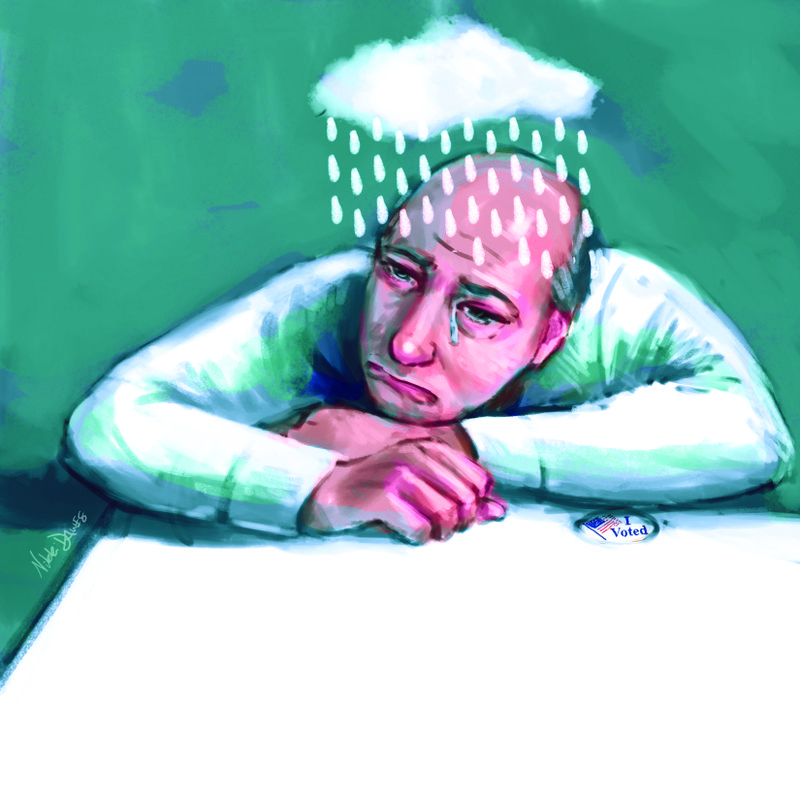By tonight -- hopefully -- roughly half of American voters will be ecstatic. Or at least not terribly sad. The other half? Not so happy. In fact, some might be depressed or downright spitting mad.
Welcome to Election Day 2016, the twilight of the presidential campaign slog when the country is truly split in two, between winners and losers.
But losers shouldn't take an election too hard. And the victors? Don't be a sore winner.
It's only an election, after all. Only a single day that guides the direction of the country for the next four years (and in the case of appointing Supreme Court justices, longer).
Truthfully, many voters will just be happy it's all over -- at least until the 2020 presidential campaign starts next week.
But what happens if a person wakes up Wednesday morning with an overwhelming sense of anxiety about the future of this country? What if they are depressed or even angry in the days and weeks following Election Day?
"When something happens that you can't change, and there's not a whole lot you can do to necessarily make it go away or get better, refocusing your attention is good," says Dr. Pedro Delgado, chairman of the department of psychiatry at the University of Arkansas for Medical Sciences and director of the UAMS Psychiatric Research Institute.
Delgado says it's best to not ruminate for too long if your candidate loses the election. Also, commiserating with other election losers "actually stokes the flame" because there's not a whole lot of positives coming out of it.
"All you're doing [then] is feeding off one another's anxieties and fears, and you are not really accomplishing something," he says. "At a certain point, taking your attention away from things that you can't change is a very healthy coping strategy."
Reassessing one's emotions also is important when faced with anger, stress, anxiety or depression, according to Howard Turney, a therapist with 25 years of experience and a professor in the University of Arkansas at Little Rock's School of Social Work.
"We can ask ourselves the question: 'Do our emotions control how we think?'" he says. "Because when our emotions take over, that's when we see irrational thinking."
There are ways to cope with election loss, though, Delgado says.
Avoiding news of a favored candidate's loss in newspapers, on TV, on the internet or through social media is probably not a realistic goal, but a person can control when he or she is exposed to that news, he says. That control actually makes dealing with the stressor easier.
It's also wise to find something you can do productively to deal with stress or to work on ways to promote positive change when faced with a negative outcome.
Finally, refocusing on the positive -- actually stepping back and taking stock of the good things in life -- is a helpful coping mechanism, Delgado says.
EVEN THE LOSERS
Michael Pakko, chairman of the Libertarian Party of Arkansas, is already prepared for the outcome of this year's presidential election. He knows that his party's presidential candidate, Gary Johnson, has a "very slim prospect" of winning.
But he's already coping, accepting the outcome and refocusing his energy on making things better -- just as Delgado says.
Running for office is "an uphill battle" for a Libertarian or any third-party candidate, says Pakko, who has been active in Libertarian politics for about a dozen years.
"The odds are stacked against us with name recognition and money and networking that goes along with being one of the major party candidates," he says. "It's always an uphill battle for a Libertarian or any third-party candidate."
So, where's the motivation for someone like Pakko? Here's his coping strategy: It's not about winning or losing, per se; it's about paving a path into the future.
"We keep plugging along, and trying to make progress with each election is the most important point, I think," he says. "We try to ... put one foot in front of the other and hope that we are able to spread our message thoroughly and better than we did the last time around.
"I think part of facing electoral defeat as a Libertarian is redefining what victory means."
Pakko says Johnson winning 3 percent of the presidential vote would be a victory, because then the Libertarian Party would become an established party in Arkansas, meaning it could avoid the resource- and time-draining ritual of petitioning its candidates onto a ballot.
The party could then immediately start planning and coordinating for the 2018 election. (Yes, there's a gubernatorial election in 2018 that includes all executive offices and the state's four U.S. House of Representatives seats.)
"We never give up hope completely," Pakko says.
GETTING SOME HELP
Delgado says it's unlikely that someone with no other risk factors is going to be thrown into an episode of clinical depression just because of the presidential election outcome. Still, there might be stress.
"Stress is very common in our lives," he says. "It can go up and down depending on things like when we were in the middle of the financial crisis and other times. I think trying to step back and take the long view of things is another good coping strategy. Don't get hung up thinking this is going to be the catastrophe."
Still, there are warning signs for depression, Delgado says. Some of them are: not being able to finish tasks at work, a disruption in sleep that last for days, loss of appetite for an extended period of time or being upset or stressed out for four or five days on end.
"Usually the best triggers are when you are finding yourself unable to do things -- whether at work or in other aspects of your life -- that before you could," he says. "So when your emotional state begins to impair your ability to function normally, that's a big red flag that says, 'You should really talk to someone.'"
And it's OK to be stressed after an election, as long as that stress doesn't manifest itself as anger or depression, Turney says.
Anger partly arises from anxiety and fear, so if anger problems surface after an election, Turney says, people should "assess [their] own level of anger and determine if it is in 'normal limits,' or if [they're] out of control with anger."
"Anger and depression are normal feelings," Turney says. "You might be a little blue, but you certainly don't need professional help. If you're really immobilized by what's happening then that's when you need to seek out help."
Style on 11/08/2016


